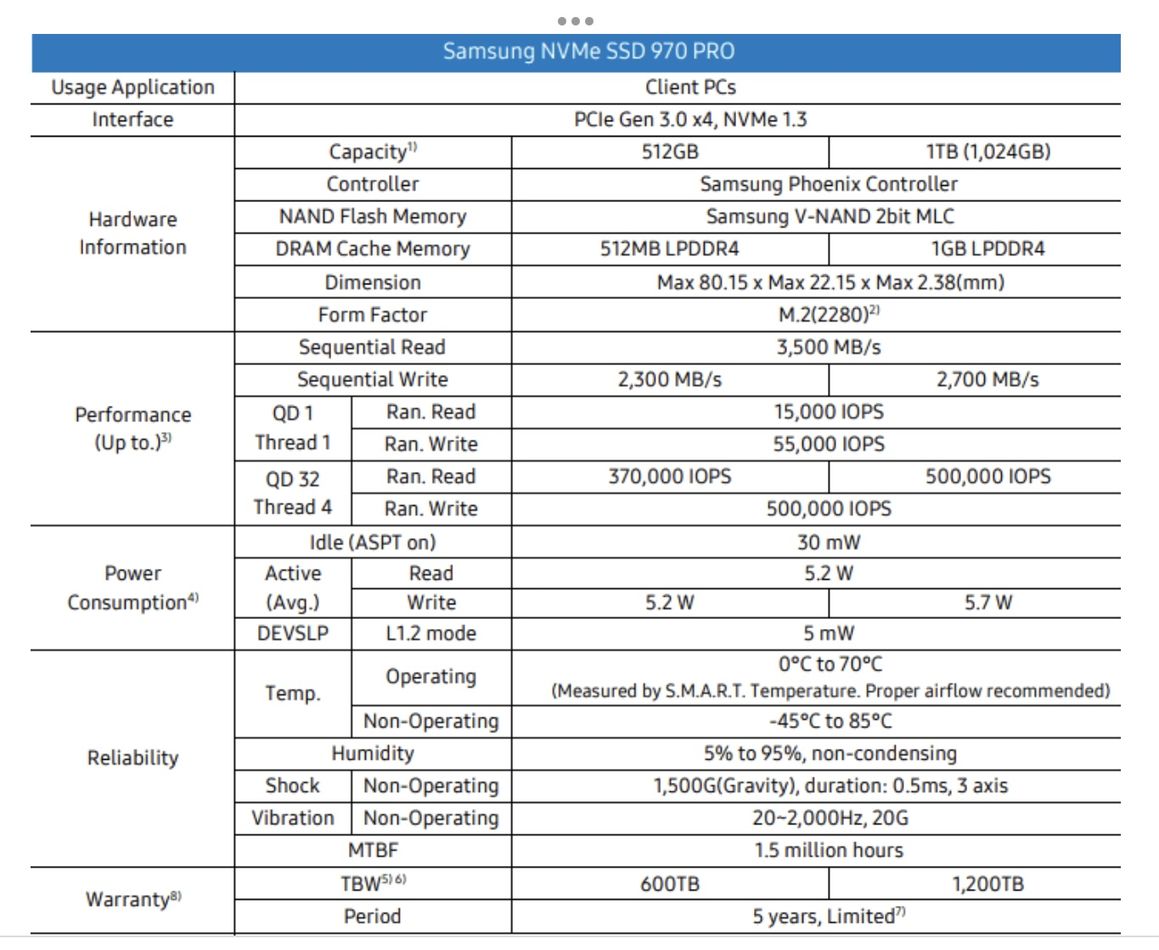Failure Rate for SSDs - BackBlaze
Mar 4, 2022 09:20:35 #
alberio wrote:
Now I better start shopping for another one without that SSD, back to the future.
Up to you.
Some people accept the trade-off as they want the speed and no G-force sensitivity.
(I don't.)
Mar 4, 2022 10:14:34 #
alberio wrote:
Now I better start shopping for another one without that SSD, back to the future.
Not a good decision. Again, this “wear out” phenomena has been blown way out of proportion. Here’s a spec sheet on the Samsung 970 pro. Take note of the following:
1) speed varies from 3500 MB/sec (reads) to 2700 MB/sec writes. A 5400 large HD typically (depends on platter density) has a speed of maybe 150 MB sec on the outer tracks and half that on the inner tracks (and that’s with the write cache enabled)
2) but here’s the real kicker. The IOPs vary from 15,000-500,000 depending on the test and the random access time is in the 25 microsecond region. An HD will do 100-200 IOPs and the random access speed is typically about 12-16 milliseconds. For random accesses (which is the majority of disk operations), the SSD is 500-1000 times faster and since a great deal of computer performance is limited by disk I/O speed, that’s a HUGE improvement.
3) and finally, regarding wearing out a disk. Note that the 1TB SSD has a max number of writes of 1200 TBytes written. That means every single sector on the SSD can be written 1200 times. Ask yourself how many TByes you typically write to a disk each year, and then calculate how many years it would take to “wear out” your SSD. Has anyone here EVER actually worn out an SSD, so it can’t write anymore? I’ve sold Exabytes of storage to every kind of customer imaginable over the years, and I’ve never seen an SSD worn out. I have had one National Lab decide against them because all they did was writes all day long which made them a bad fit after testing. And remember, the wear limit DOESN’T affect reads.

Mar 4, 2022 10:31:33 #
TriX wrote:
Not a good decision. Again, this “wear out” phenom... (show quote)

I'm still fine with HDDs. Not that I WON'T get an SSD, I just simply don't have to have one.
My wife's recent laptop came with an SSD, which is fine.

Mar 4, 2022 11:38:52 #
TriX wrote:
Not a good decision. Again, this “wear out” phenom... (show quote)
Because I'm my worst enemy, how do I tell which drive on my computer is the SSD?
Mar 4, 2022 12:29:41 #
alberio wrote:
Because I'm my worst enemy, how do I tell which drive on my computer is the SSD?
If your computer has multiple drives (and one is an SSD), it will likely be the C:/ drive
Mar 4, 2022 12:50:36 #
TriX wrote:
If your computer has multiple drives (and one is an SSD), it will likely be the C:/ drive
Thanks
Mar 4, 2022 13:48:38 #
rmorrison1116 wrote:
I wouldn't think there would be a high failure rate on devices with no moving parts...
Yes, same here. I would think that an SSD would be far more reliable than an HHD given no moving parts with an SSD.
Mar 5, 2022 09:22:24 #
jerold222 wrote:
It looks like Crucial SSDs are absolutely terrible! I have several installed in various laptops and one desktop and have had not problems yet.
I have four of those Crucial drives two in MacBook Pros, one in a windows desktop and one in an iMac. All have been working very well. One Samsung Evo in an iMac and it died in two months. Overall I think ssd’s are quite reliable
If you want to reply, then register here. Registration is free and your account is created instantly, so you can post right away.




